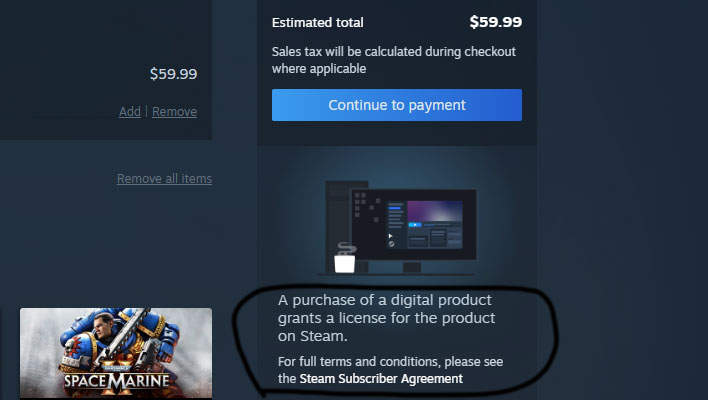I'm dating myself as an old fart, but back in my day (don't you just love that phrase?), you bought a game cartridge from KB Toys or Sears, went home and popped it into your Atari 2600 console, and started gaming. And yes, the graphics, sound effects, and controls were all crude and rudimentary by today's standards, but being able to hold a cartridge meant you essentially owned the game (even if not technically true). Things have changed considerably in today's digital distribution landscape, and to drive the point home, Steam has begun making clear that you're buying a license to play a game, as opposed to actually owning the game.
That's a key distinction and the change in verbiage at the checkout screen is likely in response to a
new California bill (AB 2426) mandating that digital storefronts be crystal clear about what a consumer is actually paying for. Here's a partial summary of the bill...
This bill would, subject to specified exceptions, additionally prohibit a seller of a digital good from advertising or offering for sale a digital good, as defined, to a purchaser with the terms buy, purchase, or any other term which a reasonable person would understand to confer an unrestricted ownership interest in the digital good, or alongside an option for a time-limited rental, unless the seller receives at the time of each transaction an affirmative acknowledgment from the purchaser, or the seller provides to the consumer before executing each transaction a clear and conspicuous statement, as specified. By expanding the scope of a crime, this bill would impose a state-mandated local program.
California Governor Gavin Newsom signed the bill into law last month, and it goes into effect starting January 1, 2025. Hence why it only seems logical that Steam is getting ahead of the legislation with a new disclaimer that appears in your virtual shopping cart.
"A purchase of a digital product grants a license for the product on Steam," the new disclaimer reads. It goes on to link buyers to the full terms and conditions outlined in Steam's
subscriber agreement.
According to the law as written, there are certain exemptions, such as services that are solely subscription-based, free games, and "permanent offline" downloads that can be used without an internet connection. But if you're paying for a game like, say,
Black Myth: Wukong, which has
sold tens of millions of units, the law applies—you're buying a license to access the game, and don't actually own the title in the traditional sense.
The good news is, this doesn't really change anything on the part of the consumer—this is how it's been, only starting next year, digital storefronts will need to be more clear about it.



